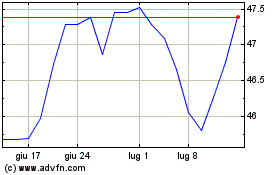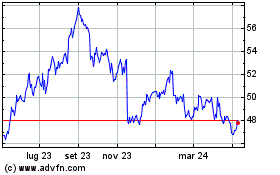By Maitane Sardon
Are robotics, 6G networks or autonomous vehicles powered by
renewable energy the next big thing? That is what many investors
are betting on.
An approach known as thematic investing, based on broad trends
such as automation and climate change, has grown in popularity over
the past few years. Funds that use a thematic strategy aren't bound
by sector or region, which usually involves higher risk. Instead,
the idea is to tap into companies that are part of -- and best
positioned to benefit from -- technological, demographic and
environmental changes sweeping the world.
"In a world littered with jargon and abstract financial theory,
thematic investing represents a pleasingly straightforward approach
to investing, " says Kenneth Lamont, senior analyst, manager
research, passive strategies at Morningstar. "Thematic strategies
tend to tap into powerful narratives that are often well-known to
investors, such as aging populations or the shift to a digital
economy, making them easy to relate to."
According to data provided by research firm Morningstar Inc.,
thematic investing on a global basis has tripled in size over the
past five years to some $40.76 billion. In addition to theme-based
funds that have popped up, some wealth advisers and brokerages have
also turned to thematic investing, using its focus on long-term and
easy-to-understand trends to help clients avoid making decisions
based on short-term market activity.
To be sure, thematic funds shouldn't replace core fund holdings.
Wealth advisers recommend holding them alongside other core funds.
For someone who has a long time frame, advisers say a good
portfolio could be built with a core-and-satellite approach, where
60% of the assets are split across two core equity funds and the
remaining 40% across equity funds using a theme-based strategy.
If an investor believes robots will become increasingly
important in the future, for example, he or she might want to
consider an ETF investing in robotics and artificial intelligence,
which are some of the fastest-growing segments within the tech
sector.
As with every investment vehicle, a skeptical approach is
needed, as some themes may be just temporary fashions that can
quickly swing out of favor. What follows is a look at some of the
themes that asset managers and wealth advisers think will be among
the biggest of the next few years.
'Peak Globalization'
The rise of political leaders with protectionist views, embodied
by the U.K.'s withdrawal from the European Union and trade tensions
between the U.S. and China, is a sign that the world has reached
the peak of globalization, according to Bank of America Merrill
Lynch's global investment strategy team.
Globalization, with its desired goals of free movement of goods,
people and capital around the world, is not coming to an end, but
it has reached its highest point, the team at Merrill says.
"There will be a time frame when investors have to ask
themselves these questions: How is the fact that companies are
reshoring their activities going to impact their profit and loss or
their cost structure? Will some of these extra costs be offset by
automation?" says Haim Israel, global strategist and managing
director of research at Merrill.
Barriers to international trade could present opportunities for
smaller firms, local markets and such unloved real assets as
commodities, farm land, real estate and precious metals. The
aerospace and defense, infrastructure, and energy and water sectors
may benefit from the growing focus on national security and
economic sovereignty, Mr. Israel says.
'Smart' everything
Many market participants agree that technology's impact on
industries, markets and people will be a key theme of the next
decade.
"We are seeing an unprecedented rate of innovation and changes;
what we call tech-celeration, the acceleration in growth that is
based on tech," says Mr. Israel.
By the end of 2030, close to 500 billion devices will be
connected to the internet, research by Cisco Systems Inc. shows.
Asset managers agree: Given the amount of time we currently spend
online -- 23.6 hours a week for the average American, according to
the think tank Center for the Digital Future -- smart and connected
devices will become ubiquitous.
"Smart meters, smart machinery, Internet-of-Things devices that
can sense everything from electricity consumption to water
consumption or carbon emissions; sensors and devices that can
monitor traffic or surveillance equipment that can be used for
future planning...all of that has a huge economic value added,"
says Mr. Israel.
Experts say investors should also consider how companies are
managing such related emerging risks as the increasing
vulnerability of users' personal information.
Defiance Quantum ETF (QTUM), which invests in companies that are
involved in the development of machine-learning technology and
quantum computing, was one of the top-performing thematic funds of
2019, up 48.2%.
Robotics
Technological advances are going to have huge impact on the job
market.
The McKinsey Global Institute estimates that up to 800 million
workers could be replaced by automation by the end of 2030. Experts
say algorithms, big data, data mining and analytics to solve
problems and perform tasks could affect not only blue-collar jobs
but also jobs in that require more skilled labor, architecture, law
and journalism.
This presents challenges and risks but also creates
opportunities that investment managers should be prepared to
leverage.
Entire companies will be at risk because they are going to be
replaced by something more technologically advanced, says Guillaume
Mascotto, vice president, head of ESG and investment stewardship at
American Century Investments, a Kansas City, Mo.-based investment
manager.
Climate
Many advisers expect companies and governments to address
climate change and rising global temperatures this decade, which
will be reflected in where they invest money.
"The move away from wood to coal and from coal to oil are energy
transitions that we see historically. Now, The cost advantage is
emerging for alternative clean energies, which presents investment
opportunities," says David Docherty, a director of thematic
investing at Schroders, a London-based asset manager that oversees
$575.06 billion.
Rising temperatures will have direct and indirect impacts, Mr.
Mascotto says. Direct impacts include short-term extreme weather
events like stronger hurricanes, heavier rainstorms and more severe
droughts. The indirect impacts are the long-term repercussions of
changing rainfall, heavy flooding and sea-level rises: migration,
altered crop life cycles and higher inequality.
Investors might consider investing in companies that can help
reduce fossil-fuel-based emissions, including renewable-power
generation or grid management. This could include investing in
countries with low renewable-energy production costs, Mr. Israel
says.
Some of the best-performing thematic ETFs of 2019 tap into this
theme. Invesco Solar ETF (TAN) and Invesco WilderHill Clean Energy
ETF (PBW) delivered annual returns of 65.7% and 61.9%,
respectively, Morningstar Research says.
Ms. Sardon is a reporter for The Wall Street Journal in
Barcelona. Email her at maitane.sardon@wsj.com.
(END) Dow Jones Newswires
January 05, 2020 22:18 ET (03:18 GMT)
Copyright (c) 2020 Dow Jones & Company, Inc.
Grafico Azioni Cisco Systems (NASDAQ:CSCO)
Storico
Da Mar 2024 a Apr 2024

Grafico Azioni Cisco Systems (NASDAQ:CSCO)
Storico
Da Apr 2023 a Apr 2024
